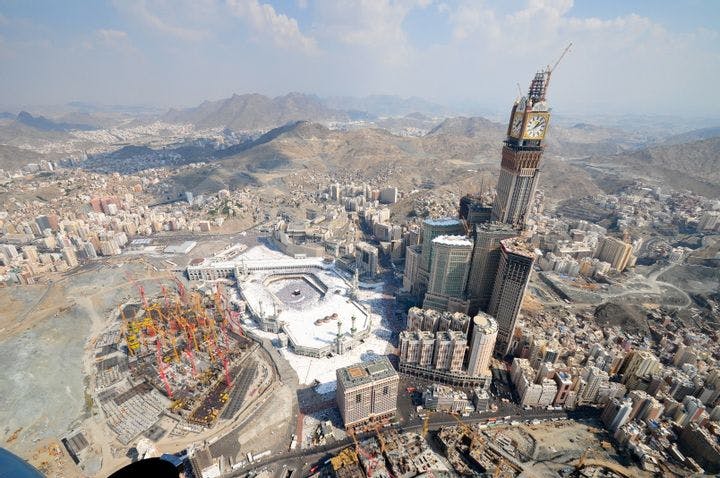Bulldozing Mecca for Luxury Condos
– Nicole Panoc
Most of Mecca’s historic sites have been razed, replaced by new hotels, luxury malls, and high-rises. Here, a glance at the “merchandizing of Mecca.”
The city of Mecca — birthplace of Muhammad, site of the Prophet’s first revelation, endpoint of the Hajj — has served as the epicenter of the Islamic faith for centuries. With this wealth of history over the centuries, one would expect the city to be rich in architecture dating back centuries. The reality could not be more different.
Were he to visit Mecca today, the Prophet may find new resonance in the old truism that you can never go home again. Writing in First Things, Stephen Schwartz, declares that “Mecca is threatened.” With the exception of the holy Kaaba, the majority of the city’s historical buildings and landmarks have been bulldozed, replaced with luxurious hotels, condominiums and shopping malls.
“The merchandizing of Mecca,” writes Schwartz, “reflects fundamentalist Wahhabi doctrine that promotes cultural vandalism, revealing how comfortable the Saudis are with consumer values of the West.” Many of these now-desecrated locations possessed religious ties and served as important points for prayer. The ancestral residences of Muhammad’s descendants have nearly all been demolished, and replaced with modern centers of commerce and tourism. The onetime home of Abu Bakr — remembered as the Prophet’s close advisor and, upon Muhammad’s death, the first caliph — was razed. In its stead sits a Hilton Hotel.
The stated motives behind such destruction can be found in religious doctrine. According to Wahhabi clerics, the existence of these Islamic sites provides temptation to worship these sites, distracting Muslims from worshiping only Allah. Schwartz quotes a fatwa issued by the Saudi office for religious rulings: “It is impermissible to exaggerate the importance of historical sites and buildings, because this might lead to Shirk [idolatry]. The laypeople may be tempted to believe that such places are blessed, and be driven to commit acts of disbelief.” If there is no god but God, they say, the only way to prevent the worship of false idols is to raze these historic sites, demolishing a piece of the Islamic past for the sake of the Islamic present and future.
Schwartz cautions against such false piety: “The intentions of the bulldozing ‘renewers’ of Mecca are clearly avaricious.” He notes that the officially stated posture grants wealthy Saudi elites the opportunity to capitalize on the sudden availability of land close to a major international tourist destination (one that practicing Muslims are compelled to visit).
Private citizens are not alone in their opportunism. Governmental efforts to ‘renew’ the city stem from the objective to improve its pilgrimage infrastructure (hence the aforementioned Hilton Hotel and, more broadly, the lodging boom). The Abraj Al-Bait Towers, a hulking cluster of Saudi government-owned skyscrapers, house not only the world’s largest clock face, but a number of upscale hotels, and a shopping mall offering nearly 4,000 international luxury brands. The imposing megatowers loom over the Grand Mosque, exhibiting the stark contrast between the antiquity of the holy Kaaba and the modernity of luxury shopping and high-rise apartments. It exemplifies what Schwartz describes as a clash between mercantilism and Mecca’s traditional role as a holy city.
At its core, the city of Mecca serves to facilitate the most important Muslim journey, the Hajj. While credible religious doctrine can justify the destruction of Mecca’s historic sites, such justifications strain credulity when those who stand to make a personal financial gain from this destruction are the same ones hurling accusations of idolatry, writes Schwartz. The development of such lavish and lucrative infrastructure — and bulldozing of world heritage sites — does little but turn the most holy of experiences into a business.
* * *
The Source: “Mecca for Sale” by Stephen Schwartz, First Things, February 2015.
Photo courtesy of Al Jazeera English/Fadi El Benni
